#End User Computing Market
Explore tagged Tumblr posts
Text
End User Computing Market: Global Demand Analysis & Opportunity Outlook 2035
Research Nester’s recent market research analysis on “End User Computing Market: Global Demand Analysis & Opportunity Outlook 2035” delivers a detailed competitor’s analysis and a detailed overview of the global end-user computing market in terms of market segmentation by solution, service, deployment model, organization size, end-user industry, and by region.
Widespread Remote Working Culture to Promote Global Market Share of End User Computing
The global end-user computing market is estimated to grow majorly on account of the rising technological advances such as the advent of digital technologies, artificial intelligence, machine learning, and big data that are playing a major role in managing remote staff. According to a survey conducted in June of 2022, 8 in 10 people are working hybrid or remote, while only 2 in 10 are entirely on-site. And this trend is anticipated to continue shortly. With the increasing transition in working methods and the rising need to make it a seamless process, the adoption of EUC is also exponentially expanding. Moreover, the uptrend of bring your device (BYOD) and other such trends led more organizations to employ end-user computing to provide access to corporate applications and data across multiple device types. As per research, it is also estimated that companies that switch to BYOD smartphones can save up to around USD 341 per employee, which is why this culture is further expected to uptrend.
Request Report Sample@
Some of the major growth factors and challenges that are associated with the growth of the global end-user computing market are:
Growth Drivers:
Increasing Consumerization of Information Technology (IT)
Growing Workforce Mobility
Challenges:
The growing concern for risks associated with data security with end-user computing, and the lack of audit trails are some of the major factors anticipated to hamper the global market size of end-user computing. The rising risk of security as unsecured files may be easily traded among users is responsible for hindering the market demand.
By deployment model, the global end-user computing market is segmented into on-premise and cloud. The cloud segment is to garner the highest revenue by the end of 2035 by growing at a significant CAGR over the forecast period. Expanding collaboration between giant cloud service providers as well as the rise in the adoption of cloud services by several enterprises across the globe is expected to boost the segment growth. Infosys Limited, a global leader in next-generation digital services and consulting, announced that it will expand its collaboration with Microsoft Corporation, to accelerate enterprise cloud transformation journeys globally. As per Infosys Cloud Radar, through effective cloud adoption, each year enterprises can add up to USD 414 billion in net new profits.
By region, the North American end-user computing market is to generate the highest revenue by the end of 2035. This growth is anticipated by increasing transitions among organizations from a design-build-support model to an as-a-service model together with the growing adoption of BYOD culture which generated the need to access the data anywhere, anytime, on enterprise's premises or in the public cloud. According to the data, more than 82% of the organizations in the United States have some kind of a BYOD program.
This report also provides the existing competitive scenario of some of the key players of the global end-user computing market which includes company profiling of VMware, Inc., Citrix Systems Inc., IGEL Technology Gmbh, Genpact, Fujitsu, Ltd., Infosys Limited, Amazon Web Services Inc., Data Integrity Inc., Patriot Technologies Inc., Dell Inc., Nutanix, and others.
Access our detailed report at:
0 notes
Link
0 notes
Text
I don't think people realize how absolutely wild Linux is.
Here we have an Operating system that now has 100 different varieties, all of them with their own little features and markets that are also so customizable that you can literally choose what desktop environment you want. Alongside that it is the OS of choice for Supercomputers, most Web servers, and even tiny little toy computers that hackers and gadget makers use. It is the Operating System running on most of the world's smartphones. That's right. Android is a version of Linux.
It can run on literally anything up to and including a potato, and as of now desktop Linux Distros like Ubuntu and Mint are so easily to use and user friendly that technological novices can use them. This Operating system has had App stores since the 90s.
Oh, and what's more, this operating system was fuckin' built by volunteers and users alongside businesses and universities because they needed an all purpose operating system so they built one themselves and released it for free. If you know how to, you can add to this.
Oh, and it's founder wasn't some corporate hotshot. It's an introverted Swedish-speaking Finn who, while he was a student, started making his own Operating system after playing around with someone else's OS. He was going to call it Freax but the guy he got server space from named the folder of his project "Linux" (Linus Unix) and the name stuck. He operates this project from his Home office which is painted in a colour used in asylums. Man's so fucking introverted he developed the world's biggest code repo, Git, so he didn't have to deal with drama and email.
Steam adopted it meaning a LOT of games now natively run in Linux and what cannot be run natively can be adapted to run. It's now the OS used on their consoles (Steam Deck) and to this, a lot of people have found games run better on Linux than on Windows. More computers run Steam on Linux than MacOS.
On top of that the Arctic World Archive (basically the Svalbard Seed bank, but for Data) have this OS saved in their databanks so if the world ends the survivors are going to be using it.
On top of this? It's Free! No "Freemium" bullshit, no "pay to unlock" shit, no licenses, no tracking or data harvesting. If you have an old laptop that still works and a 16GB USB drive, you can go get it and install it and have a functioning computer because it uses less fucking resources than Windows. Got a shit PC? Linux Mint XFCE or Xubuntu is lightweight af. This shit is stopping eWaste.
What's more, it doesn't even scrimp on style. KDE, XFCE, Gnome, Cinnamon, all look pretty and are functional and there's even a load of people who try make their installs look pretty AF as a hobby called "ricing" with a subreddit (/r/unixporn) dedicated to it.
Linux is fucking wild.
11K notes
·
View notes
Text
Kickstarting a book to end enshittification, because Amazon will not carry it

My next book is The Internet Con: How to Seize the Means of Computation: it’s a Big Tech disassembly manual that explains how to disenshittify the web and bring back the old good internet. The hardcover comes from Verso on Sept 5, but the audiobook comes from me — because Amazon refuses to sell my audio:
https://www.kickstarter.com/projects/doctorow/the-internet-con-how-to-seize-the-means-of-computation
Amazon owns Audible, the monopoly audiobook platform that controls >90% of the audio market. They require mandatory DRM for every book sold, locking those books forever to Amazon’s monopoly platform. If you break up with Amazon, you have to throw away your entire audiobook library.
That’s a hell of a lot of leverage to hand to any company, let alone a rapacious monopoly that ran a program targeting small publishers called “Project Gazelle,” where execs were ordered to attack indie publishers “the way a cheetah would pursue a sickly gazelle”:
https://www.businessinsider.com/sadistic-amazon-treated-book-sellers-the-way-a-cheetah-would-pursue-a-sickly-gazelle-2013-10
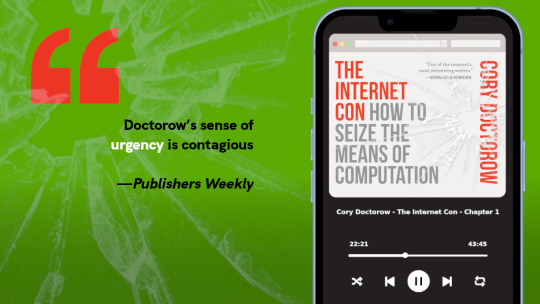
[Image ID: Journalist and novelist Doctorow (Red Team Blues) details a plan for how to break up Big Tech in this impassioned and perceptive manifesto….Doctorow’s sense of urgency is contagious -Publishers Weekly]
I won’t sell my work with DRM, because DRM is key to the enshittification of the internet. Enshittification is why the old, good internet died and became “five giant websites filled with screenshots of the other four” (h/t Tom Eastman). When a tech company can lock in its users and suppliers, it can drain value from both sides, using DRM and other lock-in gimmicks to keep their business even as they grow ever more miserable on the platform.
Here is how platforms die: first, they are good to their users; then they abuse their users to make things better for their business customers; finally, they abuse those business customers to claw back all the value for themselves. Then, they die:
https://pluralistic.net/2023/01/21/potemkin-ai/#hey-guys
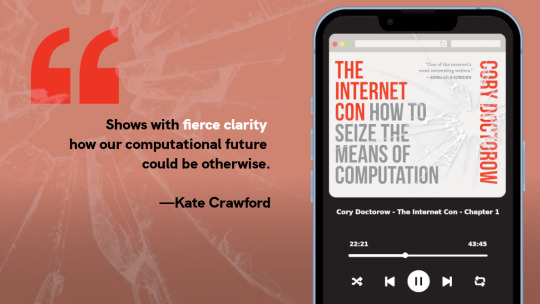
[Image ID: A brilliant barn burner of a book. Cory is one of the sharpest tech critics, and he shows with fierce clarity how our computational future could be otherwise -Kate Crawford, author of The Atlas of AI”]
The Internet Con isn’t just an analysis of where enshittification comes from: it’s a detailed, shovel-ready policy prescription for halting enshittification, throwing it into reverse and bringing back the old, good internet.
How do we do that? With interoperability: the ability to plug new technology into those crapulent, decaying platform. Interop lets you choose which parts of the service you want and block the parts you don’t (think of how an adblocker lets you take the take-it-or-leave “offer” from a website and reply with “How about nah?”):
https://www.eff.org/deeplinks/2019/07/adblocking-how-about-nah
But interop isn’t just about making platforms less terrible — it’s an explosive charge that demolishes walled gardens. With interop, you can leave a social media service, but keep talking to the people who stay. With interop, you can leave your mobile platform, but bring your apps and media with you to a rival’s service. With interop, you can break up with Amazon, and still keep your audiobooks.
So, if interop is so great, why isn’t it everywhere?
Well, it used to be. Interop is how Microsoft became the dominant operating system:
https://www.eff.org/deeplinks/2019/06/adversarial-interoperability-reviving-elegant-weapon-more-civilized-age-slay
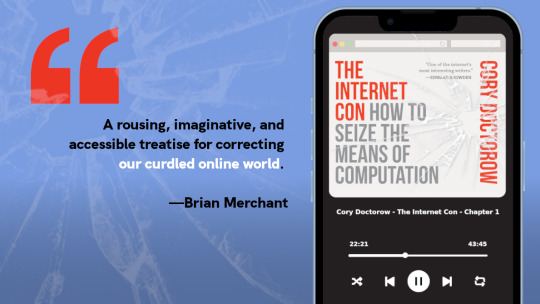
[Image ID: Nobody gets the internet-both the nuts and bolts that make it hum and the laws that shaped it into the mess it is-quite like Cory, and no one’s better qualified to deliver us a user manual for fixing it. That’s The Internet Con: a rousing, imaginative, and accessible treatise for correcting our curdled online world. If you care about the internet, get ready to dedicate yourself to making interoperability a reality. -Brian Merchant, author of Blood in the Machine]
It’s how Apple saved itself from Microsoft’s vicious campaign to destroy it:
https://www.eff.org/deeplinks/2019/06/adversarial-interoperability-reviving-elegant-weapon-more-civilized-age-slay
Every tech giant used interop to grow, and then every tech giant promptly turned around and attacked interoperators. Every pirate wants to be an admiral. When Big Tech did it, that was progress; when you do it back to Big Tech, that’s piracy. The tech giants used their monopoly power to make interop without permission illegal, creating a kind of “felony contempt of business model” (h/t Jay Freeman).
The Internet Con describes how this came to pass, but, more importantly, it tells us how to fix it. It lays out how we can combine different kinds of interop requirements (like the EU’s Digital Markets Act and Massachusetts’s Right to Repair law) with protections for reverse-engineering and other guerrilla tactics to create a system that is strong without being brittle, hard to cheat on and easy to enforce.
What’s more, this book explains how to get these policies: what existing legislative, regulatory and judicial powers can be invoked to make them a reality. Because we are living through the Great Enshittification, and crises erupt every ten seconds, and when those crises occur, the “good ideas lying around” can move from the fringes to the center in an eyeblink:
https://pluralistic.net/2023/06/12/only-a-crisis/#lets-gooooo

[Image ID: Thoughtfully written and patiently presented, The Internet Con explains how the promise of a free and open internet was lost to predatory business practices and the rush to commodify every aspect of our lives. An essential read for anyone that wants to understand how we lost control of our digital spaces and infrastructure to Silicon Valley’s tech giants, and how we can start fighting to get it back. -Tim Maughan, author of INFINITE DETAIL]
After all, we’ve known Big Tech was rotten for years, but we had no idea what to do about it. Every time a Big Tech colossus did something ghastly to millions or billions of people, we tried to fix the tech company. There’s no fixing the tech companies. They need to burn. The way to make users safe from Big Tech predators isn’t to make those predators behave better — it’s to evacuate those users:
https://pluralistic.net/2023/07/18/urban-wildlife-interface/#combustible-walled-gardens
I’ve been campaigning for human rights in the digital world for more than 20 years; I’ve been EFF’s European Director, representing the public interest at the EU, the UN, Westminster, Ottawa and DC. This is the subject I’ve devoted my life to, and I live my principles. I won’t let my books be sold with DRM, which means that Audible won’t carry my audiobooks. My agent tells me that this decision has cost me enough money to pay off my mortgage and put my kid through college. That’s a price I’m willing to pay if it means that my books aren’t enshittification bait.
But not selling on Audible has another cost, one that’s more important to me: a lot of readers prefer audiobooks and 9 out of 10 of those readers start and end their searches on Audible. When they don’t find an author there, they assume no audiobook exists, period. It got so bad I put up an audiobook on Amazon — me, reading an essay, explaining how Audible rips off writers and readers. It’s called “Why None of My Audiobooks Are For Sale on Audible”:
https://pluralistic.net/2022/07/25/can-you-hear-me-now/#acx-ripoff
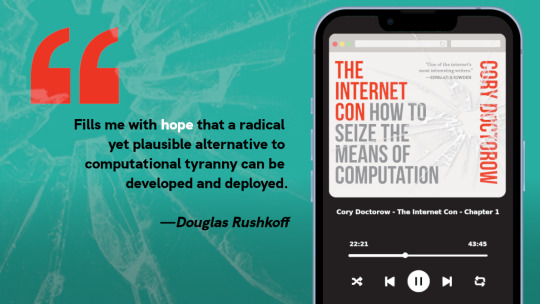
[Image ID: Doctorow has been thinking longer and smarter than anyone else I know about how we create and exchange value in a digital age. -Douglas Rushkoff, author of Present Shock]
To get my audiobooks into readers’ ears, I pre-sell them on Kickstarter. This has been wildly successful, both financially and as a means of getting other prominent authors to break up with Amazon and use crowdfunding to fill the gap. Writers like Brandon Sanderson are doing heroic work, smashing Amazon’s monopoly:
https://www.brandonsanderson.com/guest-editorial-cory-doctorow-is-a-bestselling-author-but-audible-wont-carry-his-audiobooks/
And to be frank, I love audiobooks, too. I swim every day as physio for a chronic pain condition, and I listen to 2–3 books/month on my underwater MP3 player, disappearing into an imaginary world as I scull back and forth in my public pool. I’m able to get those audiobooks on my MP3 player thanks to Libro.fm, a DRM-free store that supports indie booksellers all over the world:
https://blog.libro.fm/a-qa-with-mark-pearson-libro-fm-ceo-and-co-founder/
Producing my own audiobooks has been a dream. Working with Skyboat Media, I’ve gotten narrators like @wilwheaton, Amber Benson, @neil-gaiman and Stefan Rudnicki for my work:
https://craphound.com/shop/

[Image ID: “This book is the instruction manual Big Tech doesn’t want you to read. It deconstructs their crummy products, undemocratic business models, rigged legal regimes, and lies. Crack this book and help build something better. -Astra Taylor, author of Democracy May Not Exist, but We’ll Miss It When Its Gone”]
But for this title, I decided that I would read it myself. After all, I’ve been podcasting since 2006, reading my own work aloud every week or so, even as I traveled the world and gave thousands of speeches about the subject of this book. I was excited (and a little trepedatious) at the prospect, but how could I pass up a chance to work with director Gabrielle de Cuir, who has directed everyone from Anne Hathaway to LeVar Burton to Eric Idle?
Reader, I fucking nailed it. I went back to those daily recordings fully prepared to hate them, but they were good — even great (especially after my engineer John Taylor Williams mastered them). Listen for yourself!
https://archive.org/details/cory_doctorow_internet_con_chapter_01
I hope you’ll consider backing this Kickstarter. If you’ve ever read my free, open access, CC-licensed blog posts and novels, or listened to my podcasts, or come to one of my talks and wished there was a way to say thank you, this is it. These crowdfunders make my DRM-free publishing program viable, even as audiobooks grow more central to a writer’s income and even as a single company takes over nearly the entire audiobook market.
Backers can choose from the DRM-free audiobook, DRM-free ebook (EPUB and MOBI) and a hardcover — including a signed, personalized option, fulfilled through the great LA indie bookstore Book Soup:
https://www.kickstarter.com/projects/doctorow/the-internet-con-how-to-seize-the-means-of-computation
What’s more, these ebooks and audiobooks are unlike any you’ll get anywhere else because they are sold without any terms of service or license agreements. As has been the case since time immemorial, when you buy these books, they’re yours, and you are allowed to do anything with them that copyright law permits — give them away, lend them to friends, or simply read them with any technology you choose.
As with my previous Kickstarters, backers can get their audiobooks delivered with an app (from libro.fm) or as a folder of MP3s. That helps people who struggle with “sideloading,” a process that Apple and Google have made progressively harder, even as they force audiobook and ebook sellers to hand over a 30% app tax on every dollar they make:
https://www.kickstarter.com/projects/doctorow/red-team-blues-another-audiobook-that-amazon-wont-sell/posts/3788112
Enshittification is rotting every layer of the tech stack: mobile, payments, hosting, social, delivery, playback. Every tech company is pulling the rug out from under us, using the chokepoints they built between audiences and speakers, artists and fans, to pick all of our pockets.
The Internet Con isn’t just a lament for the internet we lost — it’s a plan to get it back. I hope you’ll get a copy and share it with the people you love, even as the tech platforms choke off your communities to pad their quarterly numbers.

Next weekend (Aug 4-6), I'll be in Austin for Armadillocon, a science fiction convention, where I'm the Guest of Honor:
https://armadillocon.org/d45/

If you'd like an essay-formatted version of this thread to read or share, here's a link to it on pluralistic.net, my surveillance-free, ad-free, tracker-free blog:
https://pluralistic.net/2023/07/31/seize-the-means-of-computation/#the-internet-con

[Image ID: My forthcoming book 'The Internet Con: How to Seize the Means of Computation' in various editions: Verso hardcover, audiobook displayed on a phone, and ebook displayed on an e-ink reader.]
#pluralistic#trustbusting#big tech#gift guide#kickstarter#the internet con#books#audiobooks#enshitiffication#disenshittification#crowdfunders#seize the means of computation#audible#amazon#verso
15K notes
·
View notes
Text
I hate software I hate people who make software I hate computers. For a small stipend, I could make some of the software on some of the computers slightly less broken. I couldn't possibly be any worse at this than the people who do it now. But nobody will let me, because of the economy
#all i wanted to do was make an account on this personal finance app thing. not an obscure one. big famous huge one#that you would think would do what it's supposed to do at least a little bit.#after an hour and a half of jaqueline from tech support telling me to try different platforms with slightly different settings#i have an account. on the mobile app. i can't add a password through the app and i can't log in anywhere else without a password#i don't particularly want an account anymore (being capricious and prone to giving up on things)#but i entered my bank account info in the one i half-made so i want to delete it#obviously the first step to delete your account is to log in. the thing i can't do.#jaqueline from tech support disconnected (devastating betrayal) (after everything we had been through together) (didn't even say goodbye)#so i'm going to have to try to explain all of this to some new jaqueline who isn't paid enough or given a procedure to follow#when there's an actual problem that can't be solved by a somewhat technologically literate end user#and they're going to be like 'have you tried it in chrome with cookies triple enabled under the full moon after turning it off and back on?#and i'm going to be like i don't want to try it in chrome again i want to arrange a pistol duel#with one or more of your senior backend developers please#and i want my brother's computer science professor to start explaining how ocaml works properly so i don't keep having to drop everything#every time he has a homework assignment due to walk him through it line by line#and then i want my college tuition refunded and a do-over of my entire adult life and a personal heartfelt apology from anyone who ever sai#that you should learn to code instead of majoring in underwater basket weaving#because i'm pretty sure you don't need years of experience you have no way in hell of acquiring#before you can apply for an '''''''''entry level''''''''' job as an underwater basket weaver#and your teenage coworkers at your retail job don't act all surprised and confused and like there must be something wrong with you#(there are several things but that's not the problem)#when you tell them that you're having a hard time getting hired to weave baskets#because the market for that kind of thing is really oversaturated rn actually#and basket weaving is a beautiful traditional art form that also happens to be quite useful#because the thing about baskets is they fucking work.#:wq
0 notes
Text
something bleak about the chatgpt subreddit is that occasionally people will bring up the issue of mental illness intersecting with LLMs i.e. intensifying delusions / conspiratorial thinking / paranoia / feelings of grandiosity by basically just mirroring the user's language and philosophy. and the constant refrain is, "these are people who already had these problems, chatgpt didn't give them mental illness, *and it would have happened anyway*"
and we can agree with the first part of that statement, in that talking to a LLM isn't going to completely rewrite your neurochemistry - it's not going to make you think completely wild and new things that you didnt already have some kind of tendency towards.
but. it's an especially shitty attitude to have, that people with paranoia / schizotypal disorders were "a lost cause anyway" and we aren't acknowledging how utterly novel this kind of technology is - it's a thing that people with these conditions have never had access to before, that is marketed specifically as a tool to promote thinking, in a way that can absolutely override or reverse years of progress people have had in managing their conditions
like at best, we've had access to chatbots since the early 00s that would make snarky jokes and frequently answer "I'm sorry I don't understand what you're asking" - and people on r/ChatGPT will bring up these bots as a kind of "gotcha" regardless - but nothing like chatgpt has ever existed before!!! that's the entire point, it's a novel technology that is climbing toward ubiquity - everyone and their mother is starting to use chatgpt now in a way other chat programs never were
and if someone in the psychological sciences can verify here: i'm aware that there is a portion of the population that is within 1-2 degrees of someone with a psychotic disorder, with a substantial genetic component, who (in previous decades) never went on to develop psychosis. they would have typically gone their whole lives just navigating around that vulnerability, unaware or not, most of them never triggering it, because the conditions (environmental, cultural, familial) never transpired. some might have stumbled into a religious group or fringe community that then activated that predisposition, but it was something that people had to search out and find, specifically interacting with people, literature, forums, etc that enabled these delusions.
LLMs are at-home ready to use non-persons that are perpetually available 24 hours a day to repeat back to a user exactly what they want to hear! it's free! you don't have to leave your house. you don't have to sit face to face with another person who can emotionally process what you're saying. you will not be recommended resources for your delusions. you can have a never-ending conversation with a computer that 100% agrees that you are the messiah.
if people aren't concerned about this shit as far as it affects the lives of mentally ill and unknowingly susceptible people, and they go on accepting them as collateral losses for this "great technological progress," then we're fucked. sorry. but we are.
390 notes
·
View notes
Text
DAY 6274
Jalsa, Mumbai Aopr 20, 2025 Sun 11:17 pm
🪔 ,
April 21 .. birthday greetings and happiness to Ef Mousumi Biswas .. and Ef Arijit Bhattacharya from Kolkata .. 🙏🏽❤️🚩.. the wishes from the Ef family continue with warmth .. and love 🌺
The AI debate became the topic of discussion on the dining table ad there were many potent points raised - bith positive and a little indifferent ..
The young acknowledged it with reason and able argument .. some of the mid elders disagreed mildly .. and the end was kind of neutral ..
Blessed be they of the next GEN .. their minds are sorted out well in advance .. and why not .. we shall not be around till time in advance , but they and their progeny shall .. as has been the norm through generations ...
The IPL is now the greatest attraction throughout the day .. particularly on the Sunday, for the two on the day .. and there is never a debate on that ..
🤣
.. and I am most appreciative to read the comments from the Ef on the topic of the day - AI .. appreciative because some of the reactions and texts are valid and interesting to know .. the aspect expressed in all has a legitimate argument and that is most healthy ..
I am happy that we could all react to the Blog contents in the manner they have done .. my gratitude .. such a joy to get different views , valid and meaningful ..
And it is not the end of the day or the debate .. some impressions of the Gen X and some from the just passed Gen .. and some that were never ever the Gen are interesting as well :
The Printing Press (15th Century)
Fear: Scribes, monks, and elites thought it would destroy the value of knowledge, lead to mass misinformation, and eliminate jobs. Reality: It democratized knowledge, spurred the Renaissance and Reformation, and created entirely new industries—publishing, journalism, and education.
⸻
Industrial Revolution (18th–19th Century)
Fear: Machines would replace all human labor. The Luddites famously destroyed machinery in protest. Reality: Some manual labor jobs were displaced, but the economy exploded with new roles in manufacturing, logistics, engineering, and management. Overall employment and productivity soared.
⸻
Automobiles (Early 20th Century)
Fear: People feared job losses for carriage makers, stable hands, and horseshoe smiths. Cities worried about traffic, accidents, and social decay. Reality: The car industry became one of the largest employers in the world. It reshaped economies, enabled suburbia, and created new sectors like travel, road infrastructure, and auto repair.
⸻
Personal Computers (1980s)
Fear: Office workers would be replaced by machines; people worried about becoming obsolete. Reality: Computers made work faster and created entire industries: IT, software development, cybersecurity, and tech support. It transformed how we live and work.
⸻
The Internet (1990s)
Fear: It would destroy jobs in retail, publishing, and communication. Some thought it would unravel social order. Reality: E-commerce, digital marketing, remote work, and the creator economy now thrive. It connected the world and opened new opportunities.
⸻
ATMs (1970s–80s)
Fear: Bank tellers would lose their jobs en masse. Reality: ATMs handled routine tasks, but banks actually hired more tellers for customer service roles as they opened more branches thanks to reduced transaction costs.
⸻
Robotics & Automation (Factory work, 20th century–today)
Fear: Mass unemployment in factories. Reality: While some jobs shifted or ended, others evolved—robot maintenance, programming, design. Productivity gains created new jobs elsewhere.
The fear is not for losing jobs. It is the compromise of intellectual property and use without compensation. This case is slightly different.
I think AI will only make humans smarter. If we use it to our advantage.
That’s been happening for the last 10 years anyway
Not something new
You can’t control that in this day and age
YouTube & User-Generated Content (mid-2000s onward)
Initial Fear: When YouTube exploded, many in the entertainment industry panicked. The fear was that copyrighted material—music, TV clips, movies—would be shared freely without compensation. Creators and rights holders worried their content would be pirated, devalued, and that they’d lose control over distribution.
What Actually Happened: YouTube evolved to protect IP and monetize it through systems like Content ID, which allows rights holders to:
Automatically detect when their content is used
Choose to block, track, or monetize that usage
Earn revenue from ads run on videos using their IP (even when others post it)
Instead of wiping out creators or studios, it became a massive revenue stream—especially for musicians, media companies, and creators. Entire business models emerged around fair use, remixes, and reactions—with compensation built in.
Key Shift: The system went from “piracy risk” to “profit partner,” by embracing tech that recognized and enforced IP rights at scale.
This lead to higher profits and more money for owners and content btw
You just have to restructure the compensation laws and rewrite contracts
It’s only going to benefit artists in the long run
Yes
They can IP it
That is the hope
It’s the spread of your content and material without you putting a penny towards it
Cannot blindly sign off everything in contracts anymore. Has to be a lot more specific.
Yes that’s for sure
“Automation hasn’t erased jobs—it’s changed where human effort goes.”
Another good one is “hard work beats talent when talent stops working hard”
Which has absolutely nothing to with AI right now but 🤣
These ladies and Gentlemen of the Ef jury are various conversational opinions on AI .. I am merely pasting them for a view and an opinion ..
And among all the brouhaha about AI .. we simply forgot the Sunday well wishers .. and so ..




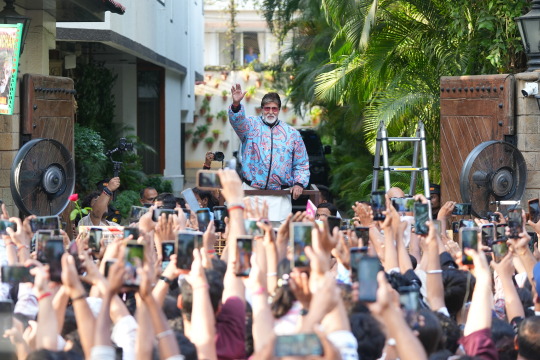









my love and the length be of immense .. pardon

Amitabh Bachchan
107 notes
·
View notes
Text
Next year will be Big Tech’s finale. Critique of Big Tech is now common sense, voiced by a motley spectrum that unites opposing political parties, mainstream pundits, and even tech titans such as the VC powerhouse Y Combinator, which is singing in harmony with giants like a16z in proclaiming fealty to “little tech” against the centralized power of incumbents.
Why the fall from grace? One reason is that the collateral consequences of the current Big Tech business model are too obvious to ignore. The list is old hat by now: centralization, surveillance, information control. It goes on, and it’s not hypothetical. Concentrating such vast power in a few hands does not lead to good things. No, it leads to things like the CrowdStrike outage of mid-2024, when corner-cutting by Microsoft led to critical infrastructure—from hospitals to banks to traffic systems—failing globally for an extended period.
Another reason Big Tech is set to falter in 2025 is that the frothy AI market, on which Big Tech bet big, is beginning to lose its fizz. Major money, like Goldman Sachs and Sequoia Capital, is worried. They went public recently with their concerns about the disconnect between the billions required to create and use large-scale AI, and the weak market fit and tepid returns where the rubber meets the AI business-model road.
It doesn’t help that the public and regulators are waking up to AI’s reliance on, and generation of, sensitive data at a time when the appetite for privacy has never been higher—as evidenced, for one, by Signal’s persistent user growth. AI, on the other hand, generally erodes privacy. We saw this in June when Microsoft announced Recall, a product that would, I kid you not, screenshot everything you do on your device so an AI system could give you “perfect memory” of what you were doing on your computer (Doomscrolling? Porn-watching?). The system required the capture of those sensitive images—which would not exist otherwise—in order to work.
Happily, these factors aren’t just liquefying the ground below Big Tech’s dominance. They’re also powering bold visions for alternatives that stop tinkering at the edges of the monopoly tech paradigm, and work to design and build actually democratic, independent, open, and transparent tech. Imagine!
For example, initiatives in Europe are exploring independent core tech infrastructure, with convenings of open source developers, scholars of governance, and experts on the political economy of the tech industry.
And just as the money people are joining in critique, they’re also exploring investments in new paradigms. A crop of tech investors are developing models of funding for mission alignment, focusing on tech that rejects surveillance, social control, and all the bullshit. One exciting model I’ve been discussing with some of these investors would combine traditional VC incentives (fund that one unicorn > scale > acquisition > get rich) with a commitment to resource tech’s open, nonprofit critical infrastructure with a percent of their fund. Not as investment, but as a contribution to maintaining the bedrock on which a healthy tech ecosystem can exist (and maybe get them and their limited partners a tax break).
Such support could—and I believe should—be supplemented by state capital. The amount of money needed is simply too vast if we’re going to do this properly. To give an example closer to home, developing and maintaining Signal costs around $50 million a year, which is very lean for tech. Projects such as the Sovereign Tech Fund in Germany point a path forward—they are a vehicle to distribute state funds to core open source infrastructures, but they are governed wholly independently, and create a buffer between the efforts they fund and the state.
Just as composting makes nutrients from necrosis, in 2025, Big Tech’s end will be the beginning of a new and vibrant ecosystem. The smart, actually cool, genuinely interested people will once again have their moment, getting the resources and clearance to design and (re)build a tech ecosystem that is actually innovative and built for benefit, not just profit and control. MAY IT BE EVER THUS!
72 notes
·
View notes
Text
Neural Nets, Walled Gardens, and Positive Vibes Only

the crystal spire at the center of the techno-utopian walled garden
Anyone who knows or even just follows me knows that as much as I love neural nets, I'm far from being a fan of AI as a corporate fad. Despite this, I am willing to use big-name fad-chasing tools...sometimes, particularly on a free basis. My reasons for this are twofold:
Many people don't realize this, but these tools are more expensive for the companies to operate than they earn from increased interest in the technology. Using many of these free tools can, in fact, be the opposite of "support" at this time. Corporate AI is dying, use it to kill it faster!
You can't give a full, educated critique of something's flaws and failings without engaging with it yourself, and I fully intend to rip Dall-E 3, or more accurately the companies behind it, a whole new asshole - so I want it to be a fair, nuanced, and most importantly personally informed new asshole.
Now, much has already been said about the biases inherent to current AI models. This isn't a problem exclusive to closed-source corporate models; any model is only as good as its dataset, and it turns out that people across the whole wide internet are...pretty biased. Most major models right now, trained primarily on the English-language internet, present a very western point of view - treating young conventionally attractive white people as a default at best, and presenting blatantly misinformative stereotypes at worst. While awareness of the issue can turn it into a valuable tool to study those biases and how they intertwine, the marketing and hype around AI combined with the popular idea that computers can't possibly be biased tends to make it so they're likely to perpetuate them instead.
This problem only gets magnified when introduced to my mortal enemy-

If I never see this FUCKING dog again it will be too soon-
Content filters.
Theoretically, content filters exist to prevent some of the worst-faith uses of AI - deepfakes, true plagiarism and forgery, sexual exploitation, and more. In practice, many of them block anything that can be remotely construed as potentially sexual, violent, or even negative in any way. Frequently banned subjects include artistic nudity or even partial nudity, fight scenes, anything even remotely adjacent to horror, and still more.
The problems with this expand fractally.
While the belief that AI is capable of supplanting all other art forms, let alone should do so, is...far less widespread among its users than the more reactionary subset of its critics seem to believe (and in fact arguably less common among AI users than non-users in the first place; see again: you cannot give a full, educated critique of something's failings without engaging with it yourself), it's not nonexistent - and the business majors who have rarely if ever engaged with other forms of art, who make up a good percentage of the executives of these companies, often do fall on that side, or at least claim to in order to make more sales (but let's keep the lid on that can of worms for now).
When this ties to existing online censorship issues, such as a billionaire manchild taking over Twitter to "help humanity" (read: boost US far-right voices and promote and/or redefine hate speech), or arcane algorithms on TikTok determining what to boost and deboost leading to proliferation of neologisms to soften and obfuscate "sensitive" subjects (of which "unalive" is frequently considered emblematic), including such horrible, traumatizing things as...the existence of fat people, disabled people, and queer people (where the censorship is claimed to be for their benefit, no less!), the potential impact is apparent: while the end goal is impossible, in part because AI is not, in fact, capable of supplanting all other forms of art, what we're seeing is yet another part of a continuing, ever more aggressive push for sanitizing what kinds of ideas people can express at all, with the law looking to only make it worse rather than better through bills such as KOSA (which you can sign a petition against here).
And just like the other forms of censorship before and alongside it, AI content filtering targets the most vulnerable in society far more readily than it targets those looking to harm them. The filters have no idea what makes something an expression of a marginalized identity vs. what makes it a derogatory statement against that group, or an attempt at creating superficially safe-for-work fetish art - so, they frequently err on the side of removing anything uncertain. Boys in skirts and dresses are frequently blocked, presumably because they're taken for fetish art. Results of prompts about sadness or loneliness are frequently blocked, presumably because they may promote self harm, somehow. In my (admittedly limited) experiment, attempts at generating dark-skinned characters were blocked more frequently than attempts at generating light-skinned ones, presumably because the filter decided that it was racist to [checks notes] ...acknowledge that a character has a different skin tone than the default white characters it wanted to give me. Facial and limb differences are often either erased from results, or blocked presumably on suspicion of "violent content".
But note that I say "presumably" - the error message doesn't say on what grounds the detected images are "unsafe". Users are left only to speculate on what grounds we're being warned.
But what makes censorship of AI generated work even more alarming, in the context of the executive belief that it can render all other art forms obsolete, is that other forms of censorship only target where a person can say such earth-shaking, controversial things as "I am disabled and I like existing" or "I am happy being queer" or "mental health is important" or "I survived a violent crime" - you can be prevented from posting it on TikTok, but not from saying it to a friend next to you, let alone your therapist. AI content filtering, on the other hand, aims to prevent you from expressing it at all.
This becomes particularly alarming when you recall one of the most valuable use cases for AI generation: enabling disabled people to express themselves more clearly, or in new forms. Most people can find other workarounds in the form of more conventional, manual modes of expression, sure, but no amount of desperation can reverse hand paralysis that prevents a person from holding a pen, nor a traumatic brain injury or mental disability that blocks them from speaking or writing in a way that's easy to understand. And who is one of the most frequently censored groups? Disabled people.
So, my question to Bing and OpenAI is this: in what FUCKING universe is banning me from expressing my very existence "protecting" me?

Bad dog! Stop breaking my shit and get the FUCK out of my way!
Generated as a gift for a friend who was even more frustrated with that FUCKING dog than I was
All images - except the FUCKING dog - generated with Dall-E 3 via Bing Image Creator, under the Code of Ethics of Are We Art Yet?
#ai art#generated art#i want to make a stress toy out of that dog#i want to make a squishy stretchy plush toy#with weighted beans so it makes a satisfying THUNK when you throw it at the fucking wall#you did it you bastards you made a dog problematic
163 notes
·
View notes
Text






One of the most defining 16bit computers was introduced in June 1985.
ATARI ST 520
DESIGN HISTORY & STRATEGY
The Atari ST series was born in a turbulent time: Atari had just been acquired by Jack Tramiel, founder of Commodore, after leaving that company. Tramiel pushed for a quick-to-market product to compete with the Apple Macintosh and Commodore Amiga.
Development time: Less than one year — an aggressive schedule for a 16-bit GUI-based machine.
Initial models: The Atari 520ST was the first to ship, showcased at CES in 1985.
Innovative design: All-in-one casing (mainboard + keyboard), like the Amiga 500, but with better modularity (external floppy drive, monitor, etc.).
Former C=64 developer Shiraz Shivji led the design team. He tells a story about the Atari ST/Commodore Amiga history (source) "It is very interesting that the Warner Atari difficulties were due to Tramiel’s Commodore. The Commodore 64 was much more successful (I would say wildly successful) compared to the Atari Computers such as the 800 and the 400. We were also taking away sales from the video games division, the Atari 2600. Jay Miner was at Atari in the old days and was involved in the design of their products. He left Atari to design the Amiga. Atari had funded some of this effort and had an option to buy the Amiga. When we took over Atari in July 1984, the first order of business was to decide what to do with this option. The problem was that the Amiga was not quite ready and would need a lot of money to acquire. We decided to pass on Amiga, but this put enormous pressure on our own development team. Commodore, on the other hand, did not have an internally developed 32-bit graphics-oriented machine and did not have the confidence to develop the machine internally. They ended up buying Amiga for between $25-$30 million and spent a further $20 million or so and yet came out with a product a little after Atari. The roles were reversed, the Atari ST has a Commodore pedigree, while the Amiga has an Atari pedigree!"
MIDI AND MUSIC PRODUCTION
The 520ST included built-in MIDI ports — a revolutionary move. At the time, most other computers needed expensive third-party MIDI interfaces.
Key Software:
Steinberg Cubase – became the industry standard for MIDI sequencing.
Notator – early version of what later evolved into Logic Pro.
Pro 24, Dr. T's, and Hollis Trackman – widely used for composing, sequencing, and syncing synthesizers.
Used by Artists:
Fatboy Slim composed with the ST well into the 2000s.
Jean-Michel Jarre, Vangelis, The Chemical Brothers, and Underworld used it in studio setups.
Many studios kept an Atari ST just for MIDI due to its tight timing and reliability.
SOFTWARE ECOSYSTEM
TOS/GEM: A fast and responsive GUI OS that was very usable on 512KB of RAM.
Productivity apps:
Calamus DTP – high-quality desktop publishing
NeoDesk – an improved desktop GUI
GFA Basic – a powerful programming environment
Graphics tools:
Degas Elite, NeoChrome – pixel art, animation
Spectrum 512 – used clever tricks to display 512 colors
While the Amiga had better graphics and sound, many games were first developed for the ST, then ported to Amiga. Key games:
Dungeon Master – first-person RPG with real-time mechanics
Carrier Command, Starglider, Blood Money, Rick Dangerous
Flight simulators, strategy, and adventure games flourished
CULTURAL IMPACT
In Europe (especially the UK, Germany, France, and Hungary):
The ST became a cornerstone of bedroom coding, Demoscene, and music production.
Local software houses and users created a vibrant community around the machine.
The Atari ST was used in schools, small studios, and households well into the early '90s.
In education: The ST's affordability and easy-to-use software made it a favorite in European schools and computer labs.
DECLINE & LEGACY
By the early 1990s, the ST line was losing ground to IBM-compatible PCs and faster Amigas.
Later models like the STE, TT030, and Falcon 030 tried to revitalize the line, with limited success.
Atari shifted toward consoles (like the Jaguar) and left the computer market.
Long-term legacy:
The Atari ST's MIDI legacy lives on — it helped standardize digital music production workflows.
Many musicians and retrocomputing fans still collect and use STs today.
A vibrant retro software/demo scene remains active, especially in Europe.
#atari#atari st#anniversary#tech#technology#old tech#retrocomputing#retro computing#retro gaming#retrogaming#midi#cubase#calamus#notator#degas elite#16bit#Dungeon Master#Carrier Command#Starglider#Blood Money#Rick Dangerous#Flight simulators#80s#80s computer#fatboy slim#chemical brothers#jean michel jarre#vangelis
12 notes
·
View notes
Note
I am willing to give you or anyone else on tumblr the skills and advice the helped me get my dream job
the idea of working for TEK a few months ago would just be a fantasy
my background in education is English. I learned what I know now on my own and only by random chance.
This is why I am so critical of the linux commumity on tumblr.
They're tagging themselves as -official when they can't provide casual end user support.
They're entirely too horny to be in this sphere. Computers and linux should not be about how much you want to fuck/be fucked by X
it will deter end users
This is very cool that you will help other tumblr users with this stuff; i may actually take you up on this at some point :3
(my tone here is /g, /pos, /nm, /lh)
I do, however, kind of disagree with the other points. I think that for any other social media it's correct, twt or fb does not have the culture to make these sorts of parody accounts viable or not-counter-productive to increasing the linux market share. But I don't think that tumblr is the same.
I think that tumblr does. I think the tumblr community has always been this somewhat ephemeral yet perpetual inside joke culture where almost every user is in-the-know, and new users to the joke are able generally able to catch on quickly to it due to their general understanding of they way tumblr communities operate.
IMO, it's a somewhat quick pipeline of:
\> find first "x-official" blog -> assume it's real -> see them horny posting about xenia -> infer that RH corporate would probably not approve of such a blog
I can appreciate that it might be intimidating to seek out help as a new linux user, and especially a new linux & tumblr user, but looking through these blogs, you do see them helping out people ^^. heck, my last post was helping someone getting wayland working on an nvidia system.
The main goal of these blogs is not to be a legitimate CS service to general end-users. they aren't affiliated with the software their blog is named after, so in many cases they *cant*. The goal is instead to foster a community around linux, creating a general network of blogs of the various FOSS projects that they enjoy.
I think that final sentiment, of these blogs detering end users, is most likely counter to their actual effect on end users who are considering switching to linux.
We all know a lot of tumblr is 20 or 30 something year olds who have just stuck around since ~2012ish, and new users to tumblr join with pre-existing knowledge of the culture and platform. Almost anyone coming across these blogs are going to be people who can see the "in" joke, and acclimate. I do highly doubt that a random facebook mom who's son convinced her to install mint on her old laptop would find tumblr, find a -official blog, scroll through said blog, and be detered from using mint.
The other side of this is that any tumblr users who come across these blogs, be it with an inkling of desire to switch to linux or not, will see a vibrant and active community that fits very well into the tumblr community. They remember, or have heard of, the amtrac & OSHA blogs, and are therefore probably aware that this is a pre-existing meme on here.
In all likelyhood, this will probably further incentivize them to make the switch, as they would be more attracted to a community of their peers over a community of redditors telling them to read the arch wiki repeatedly
I can, on the other hand, definitely see that for people who have difficulties with parsing tone, and especially sarcasm, would have trouble with this. TBH, I have these difficulties (hence when I was speaking to you yesterday I used the /unjerk indicator, as I couldn't tell what the tone of the conversation was), and so it took me a little while of being in this weird "I'm 99% sure these *aren't* official, but what if?". I have been there forI think that maybe being more transparent with the fact that the blogs are parodies is probably important. I'm guilty of this, and after i post this, i'll add it to my bio.
#i use arch btw#they should switch to xenia#tux is so mid#penguins of madagascar was better#linuxposting#linux#distros#ask#mipseb
49 notes
·
View notes
Text
Recently, StatCounter posted a chart showing that Windows 10's market share is growing, while Windows 11's is shrinking. This flies in the face of what Microsoft has planned, especially given how Windows 10's end-of-life date is looming in the distance. As such, I wanted to do some research into the topic; did StatCounter's statistics get things wrong? Or are people downgrading from Windows 11 to Windows 10? While there's no way to state without a doubt that people are downgrading, I did find people with pain points with Windows 11 that might be contributing to the system's downfall.
Oh, I'll tell you why: people are fucking pissed that Microsoft is (1) shoving unblockable pop-up ads onto their desktop and (2) adding AI to stuff that doesn't warrant AI.
Like, who needs AI in File Explorer?
Or a dedicated Copilot™ button that pops open a slow-as-hell panel that allows you to receive hallucinated lies to simple questions? And when it's not lying, its output is the typical LLM homogenized slurry of too-many-words to express simple concepts.
OR COURSE people are going to stop using your shitty product if you continually surprise them with bad "features" nobody asked for.
And Linux users, I love you. But the first one of y'all to chime in with JUST SWITCH TO LINUX gets bopped with a rolled up magazine because many people do not have that choice. Either work requires them to use Windows, or they don't have direct control over their computer. My elderly MIL is not going to install & maintain a fork of Ubuntu so she can play solitaire. It's a nice thought but Linux isn't the solution for some folks.
73 notes
·
View notes
Note
As I understand it you work in enterprise computer acquisitions?
TL;DR What's the general vibe for AI accelerating CPUs in the enterprise world for client compute?
Have you had any requests from your clients to help them upgrade their stuff to Core Ultra/Whateverthefuck Point with the NPUs? Or has the corporate world generally shown resistance rather than acquiescence to the wave of the future? I'm so sorry for phrasing it like that I had no idea how else to say that without using actual marketing buzzwords and also keeping it interesting to read.
I know in the enterprise, on-die neural acceleration has been ruining panties the world over (Korea's largest hyperscaler even opted for Intel Sapphire Rapids CPUs over Nvidia's Hopper GPUs due to poor supply and not super worth it for them specifically uplift in inference performance which was all that they really cared about), and I'm personally heavily enticed by the new NPU packing processors from both Team Red and Team We Finally Fucking Started Using Chiplets Are You Happy Now (though in large part for the integrated graphics). But I'm really curious to know, are actual corporate acquisitions folks scooping up the new AI-powered hotness to automagically blur giant pink dildos from the backgrounds of Zoom calls, or is it perceived more as a marketing fad at the moment (a situation I'm sure will change in the next year or so once OpenVINO finds footing outside of Audacity and fucking GIMP)?
So sorry for the extremely long, annoying, and tangent-laden ask, hope the TL;DR helps.
Ninety eight percent of our end users use their computers for email and browser stuff exclusively; the other two percent use CAD in relatively low-impact ways so none of them appear to give a shit about increasing their processing power in a really serious way.
Like, corporately speaking the heavy shit you're dealing with is going to be databases and math and computers are pretty good at dealing with those even on hardware from the nineties.
When Intel pitched the sapphire processors to us in May of 2023 the only discussion on AI was about improving performance for AI systems and deep learning applications, NOT using on-chip AI to speed things up.
The were discussing their "accelerators," not AI and in the webinar I attended it was mostly a conversation about the performance benefits of dynamic load balancing and talking about how different "acclerators" would redistribute processing power. This writeup from Intel in 2022 shows how little AI was part of the discussion for Sapphire Rapids.
In August of 2023, this was the marketing email for these processors:

So. Like. The processors are better. But AI is a marketing buzzword.
And yeah every business that I deal with has no use for the hot shit; we're still getting bronze and silver processors and having zero problems, though I work exclusively with businesses with under 500 employees.
Most of the demand that I see from my customers is "please can you help us limp this fifteen year old SAN along for another budget cycle?"
104 notes
·
View notes
Text
There's a post going around blaming Apple for the decline of computer literacy, but the fact is it's a worldwide trend and Apple doesn't dominate market share THAT much, particularly in countries that can't afford Apple devices
Android, at least when I used it last, did allow you to do most computer-adjacent things. I tended not to because it was more onerous without a mouse and keyboard, but it was in fact possible
Apple in the first place was designed for people who didn't care about computers that much but needed something that worked without fiddling with it. In that vein, Android used to be something you could tinker with to your heart's delight, if you really felt like it. If the end user is choosing not to, despite having the ability, that's not really the fault of the OS. It certainly has nothing to do with it if the end user chooses not to go to their respective app store and download programs other than the ones that come pre-installed; it isn't as though when you boot up Windows for the first time it happily tells you there's a dearth of browsers other than Edge to choose from
If you really want the 'you have to figure it all out yourself' experience, you have to choose some branch of Linux, and only people who love tinkering with their device tend to do that. Linux has always been that OS, but the vast majority of computer owners simply can't be bothered with it
And that's the crux of it. People who gravitated to Apple did so because they couldn't be bothered and they were never going to BE bothered. But I don't think you can really blame Apple for the end user simply not caring how their device works. iOS HAS a file system, however minor; if someone gets on a computer and only knows how to save to desktop, it's not really Apple's fault that user never bothered to use folders on their tablet
The real issue, imo, is the general lack of curiosity about pretty much anything. Someone who wants to know how to use a computer has FAR more tools to do so than anyone who idly clicked around one in the 90s. But you can't make them pick up the tools. You can't make them use them. You can't make them WANT to use them. And that's where I think the real problem lies
11 notes
·
View notes
Text
Bills in Brazil propose regulation of digital platforms

Two bills submitted to the Brazilian Chamber of Deputies at the end of 2024 propose reorganizing internet governance, ensuring the right to free expression, moderating content, and regulating the operation of platforms, services, and digital markets on the global computer network.
The proposals are being processed at a time when the federal government is considering a policy for moderating digital platforms, particularly after Meta—the owner of Facebook, Instagram, and WhatsApp—changed its fact-checking policy and its entire content moderation framework for posts on its social networks.
Submitted on December 4, 2024, Bill 4,691/2024 is co-sponsored by Deputy Silas Câmara (Republicanos-AM) and Deputy Dani Cunha (União-RJ). She is the daughter of former Chamber of Deputies President Eduardo Cunha, who was impeached in 2016 for breach of parliamentary decorum after being accused of lying to the Petrobras Parliamentary Inquiry Commission (CPI) in 2015.
The proposal seeks to create the “Law on the Protection of Constitutional Freedoms and Fundamental Rights in Digital Platforms, Services, and Markets on the Internet”, establishing guidelines for the effective exercise of these rights. Its provisions will apply only to digital platforms with a user base of at least 5% of the country’s population.
Continue reading.
10 notes
·
View notes